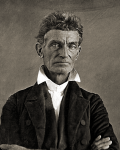Two of John Brown’s sons, John, Jr. and Jason, sold their Ohio farms and set off for Kansas by river with their wives and children. They arrived in St. Louis without incident and took on supplies there. In April of 1855 they boarded the New Lucy to steam up the Missouri to the territory. The ship didn’t have much elbow room and put the Browns in close quarters with avowed proslavery men, well armed and well lubricated. The fruit trees and grape vines they brought with them looked out of place on the ex officio proslavery troop transport. According to Junior,
for the first time arose in our minds the query: Must the fertile prairies of Kansas, through a struggle at arms, be first secured to freedom before free men can sow and reap? If so, how poorly we were prepared for such work will be seen when I say that, for arms, five of us brothers had only two small squirrel rifles and one revolver.
The Brown boys had the kind of weaponry you would expect of farmers: something to deal with pests in the field and maybe something to help with slaughtering livestock. The passionate talk about Kansas’ struggle for freedom hadn’t yet led to more than one small and one rather larger bout of election violence, which westerners like the Browns probably shrugged off. Now it all came to meet them on the New Lucy.
The Browns can’t have liked that one bit, but as they passed through Missouri another matter commanded their attention. Cholera struck the crowded boat. Jason and Ellen’s son Austin
aged four years, the elder of his two children, fell victim to this scourge; and while our boat lay by for repair of a broken rudder at Waverley, Mo., we buried him at night near that panic-stricken town, our lonely way illumined only by the lightning of a furious thunderstorm. True to his spirit of hatred off Northern people, our captain, without warning to us on shore, cast off his lines and left us to make our way by stage to Kansas City, to which place we had already paid our fare by boat.
All class on board the New Lucy. Steamers usually stopped for the night rather than risk finding a rock, log, or sandbar the hard way. The Lucy might have run through the night to make up for lost time courtesy of that broken rudder, since steamboat captains prided themselves on beating past records. Brown doesn’t say that the captain knew of their absence and doesn’t provide other evidence for his hating Yankees, but they could reasonably suspect at least that he took frustrating them as a fringe benefit.
The Browns had to make their way by land, which took them through the heart of Missouri’s enslaving country. Having not packed the food for that journey, they went to buy it from farms they passed on the way
but the occupants, judging from our speech that we were not from the South, always denied us, saying, ‘we have nothing for you.’ The only exception to this answer was at the stage-house at Indpendence, Mo.

You must be logged in to post a comment.